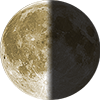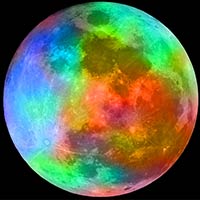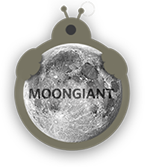
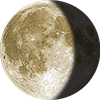 September 2 Waning Gibbous 68% |
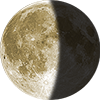 September 3 Waning Gibbous 58% |
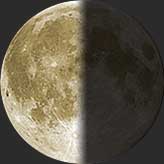 Last Quarter Illumination: 46% |
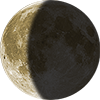 September 5 Waning Crescent 35% |
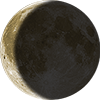 September 6 Waning Crescent 24% |
Moon Phase: September 04, 2026
On this day the Moon will be in a Last Quarter phase. This phase occurs roughly 3 weeks after the New Moon when the Moon is three quarter of the way through it’s orbit around the earth. If you live in the northern hemisphere the Moons left side will be illuminated and the right side will be dark. For those of you in the southern hemisphere it will be the opposite with the right side illuminated. Also called a Third Quarter phase, it will rise around midnight on the eastern horizon and set in the west around noon the next day. In the days following the Third Quarter Phase the Moon’s illumination will decrees each day until the New Moon.
Visit the September 2026 Moon Phases Calendar to see all the daily moon phase for this month.
Last Quarter Phase
The Last Quarter on September 4 has an illumination of 46%. This is the percentage of the Moon illuminated by the Sun. The illumination is constantly changing and can vary up to 10% a day. On September 4 the Moon is 22.5 days old. This refers to how many days it has been since the last New Moon. It takes 29.53 days for the Moon to orbit the Earth and go through the lunar cycle of all 8 Moon phases.
Today's Moon Sign: ♑ Capricorn
The current zodiac moon sign is Capricorn, positioned at 21.16° within the sign. The Moon entered Capricorn on Loading... and will shift into Aquarius on Loading.... The zodiac moon sign represents the position of the Moon as it moves through the twelve signs of the zodiac. Each zodiac moon sign lasts about 2 to 2.5 days as the Moon travels through that part of the sky.
The 8 Lunar Phases
There are 8 lunar phases the Moon goes through in its 29.53 days lunar cycle. The 4 major Moon phases are Full Moon, New Moon, First Quarter and Last Quarter. Between these major phases, there are 4 minor ones: the Waxing Crescent, Waxing Gibbous, Waning Gibbous and Waning Crescent. For more info on the Moon Cycle and on each phase check out Wikipedia Lunar Phase page.
Phase Details for - September 4
Illumination: 46%
Moon Age: 22.50 days
Moon Angle: 0.55
Moon Distance: 363,697.79 km
Sun Angle: 0.53
Sun Distance: 150,835,245.00 km
Useful Moon Resources
Check the weather before a night of Moon gazing at weather.com
For a list of all the current meteor showers visit American Meteor Society
Last Quarter Moonrise and Moonset
